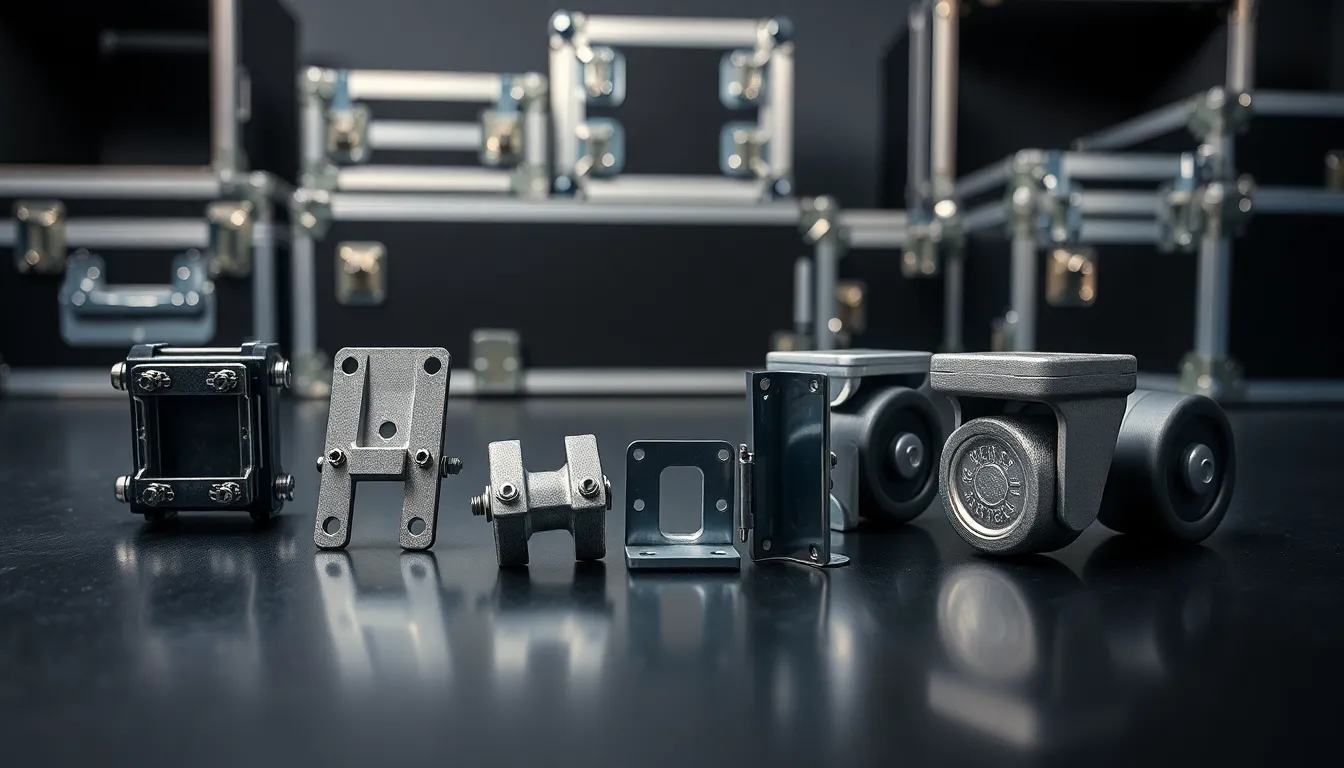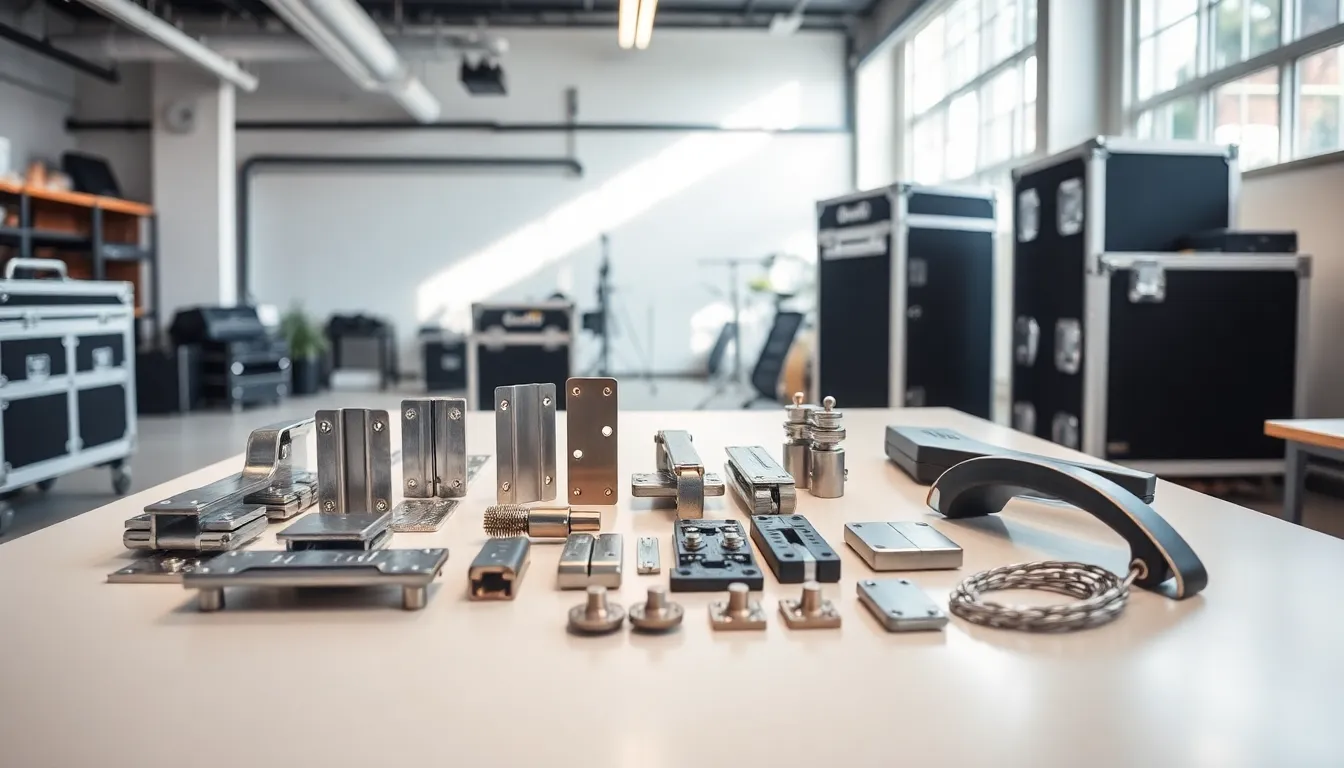Have you ever tried lugging around a fragile instrument without proper protection? It’s like sending a toddler to school with a hundred-dollar pizza, something is bound to break. Enter road case hardware, the unsung hero of equipment transport. This guide dives into everything you need to know about keeping your gear safe, sound, and ready for action wherever the road takes you. So let’s buckle up and explore the nuts and bolts behind road case hardware.
Table of Contents
ToggleUnderstanding Road Case Hardware

Road case hardware isn’t just for show: it’s the armor for your precious gear. Produced from durable materials like steel and aluminum, this hardware ensures your equipment can withstand the rigors of travel, whether you’re crossing town or the country. Thankfully, road cases come fitted with a variety of hardware components that enhance both functionality and protection. It’s essential to understand the role of these components, as they all work together to keep your equipment safe.
Road cases often serve a dual purpose by also providing convenient storage solutions. With compartments designed for specific items, these cases keep everything organized, reducing the risk of damage during transit. In a nutshell, understanding road case hardware leads to better protection, effective organization, and peace of mind.
So, why is this hardware so crucial? Well, think of it as a shield for everything from guitars to sound mixers. Without it, your gear would be an accident waiting to happen. A sturdy set of latches, corners, and wheels can make all the difference. In the end, investing in quality road case hardware isn’t just wise: it’s essential.
Types of Road Case Hardware
Not all road case hardware is created equal. There’s a variety of components designed to cater to specific needs, making it crucial to select the right type. Below are some commonly used categories:
Latches
Latches are the first line of defense, providing secure closure to your cases. You can find different styles, such as butterfly and slam latches, designed for ease of use and security.
Hinges
Hinges allow for smooth opening and closing of your road cases. Look for continuous or piano hinges, ensuring durability even after repeated use.
Corners
These protect the edges of the case, which are often the first to show wear. Options like plastic or metal corners offer varying levels of protection and aesthetic appeal.
Handles
Handles are crucial for transportation. Depending on your needs, you might opt for recessed, pull-out, or side-mounted styles, each designed for comfort and convenience.
Wheels
If you’re moving heavy gear, wheels can be a game changer. Fixed and swivel casters make mobility easy, reducing the physical toll during transport.
With such a variety of hardware types available, considering the specific requirements of each case and the equipment it will protect is important.
Essential Components of Road Case Hardware
When it comes to road case hardware, some components are truly essential. Knowing what these are can save you time, money, and plenty of headaches:
Locking Mechanisms
Locking mechanisms provide peace of mind. A good road case should feature a reliable locking system that discourages theft and keeps your gear secure.
Interlocking Flanges
These flanges help create a stronger, more durable bond between the case and its lid, enhancing overall integrity. It’s a small detail that can lead to big improvements in protection.
Foam Inserts
Foam isn’t hardware, but it deserves a mention. Custom-cut foam ensures your equipment fits snugly within the case, absorbing shocks and bumps during travel.
Reinforced Edges
Reinforced edges enhance durability. They provide additional protection against wear and tear, ensuring your case lasts longer.
Understanding these essential components will guide users in building a road case that can withstand the toughest conditions without compromising the integrity of the equipment inside.
Choosing the Right Hardware for Your Road Cases
Selecting the proper hardware can seem daunting, especially with so many options. To simplify this task, keep the following factors in mind:
Equipment Weight and Size
Lighter equipment may require less robust hardware, while heavier items necessitate sturdy components capable of supporting greater loads. Assess your needs carefully.
Frequency of Travel
If you’re a road warrior who’s constantly on the go, investing in higher-quality materials will pay off. Durable hardware will withstand constant use better than cheaper alternatives.
Type of Equipment
Different types of equipment have varying requirements. For instance, delicate recording gear may need more stringent protection than rugged stage equipment.
Container Design
The overall design of the case will influence the choice of hardware. Some cases may already have specific mounting points in place, so selecting compatible hardware is key.
Budget
Finally, factor in your budget. Quality road case hardware doesn’t have to expensive, but it’s essential to find the balance between cost and durability. Remember, investing now can save money down the road by preventing damage to your gear.
Installation Tips and Best Practices
Successfully installing road case hardware takes some know-how. Here are some best practices to ensure everything fits snugly:
Pre-Planning
Before diving in, map out where each component will go. Sketching a diagram can save you from any last-minute surprises.
Leveling
Ensure all components are leveled during installation. Using a level can help avoid misalignment, which could lead to gaps or improper closure later.
Use the Right Tools
Quality tools ensure precision. A drill, screwdrivers, and measuring tape are essential so you can make every adjustment without hassle.
Double-Check Measurements
Measure twice, so you can cut once, or, in this case, screw. Misplaced holes could weaken the case integrity.
Securely Fasten
Use appropriate screws for each hardware type. Avoid over-tightening, which could strip screws and create unnecessary wear.
By applying these tips, anyone can create a functional, durable road case that will stand the test of time.
Maintaining Road Case Hardware
Maintenance is key if you want to prolong the life of your road case hardware. Here are essential steps to keep everything in tip-top shape:
Regular Inspections
Conduct regular inspections of all components. Check for rust, loose screws, or any signs of wear and tear.
Cleanliness
Keeping it clean is essential. Wipe down surfaces with a damp cloth to remove dirt and grime that could weaken hardware integrity.
Lubrication
Don’t forget to lubricate moving parts like hinges and latches. A little oil goes a long way in maintaining smooth function.
Replacement Parts
Stock up on spare parts. Should any component break or wear out, having a replacement handy can save you from delays or disruption.
Store Properly
If not in use, store your road cases upright and protect them from extreme fluctuations in temperature. Proper storage helps materials maintain their integrity.
Incorporating these maintenance tips will help ensure that your road case hardware serves you well for years to come.




